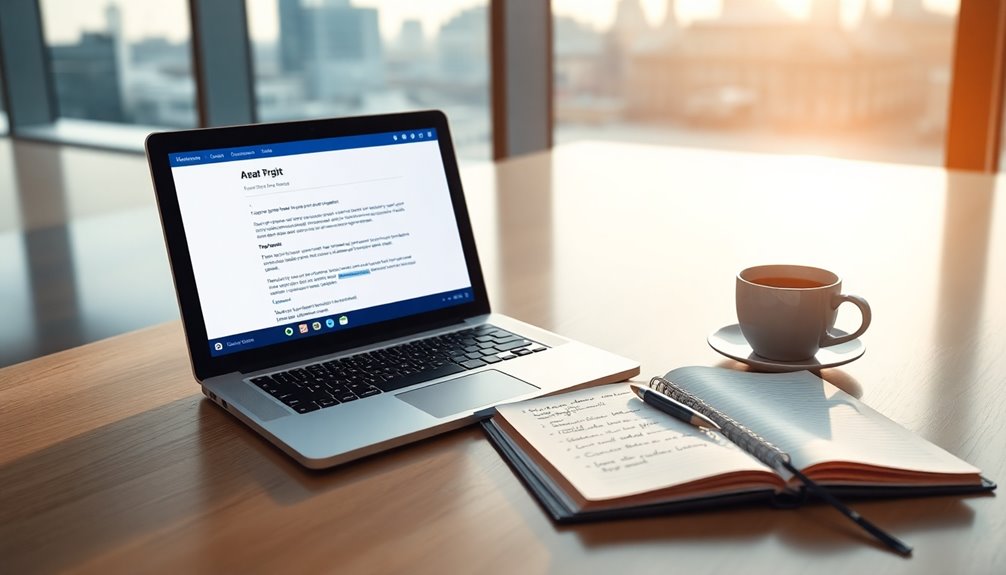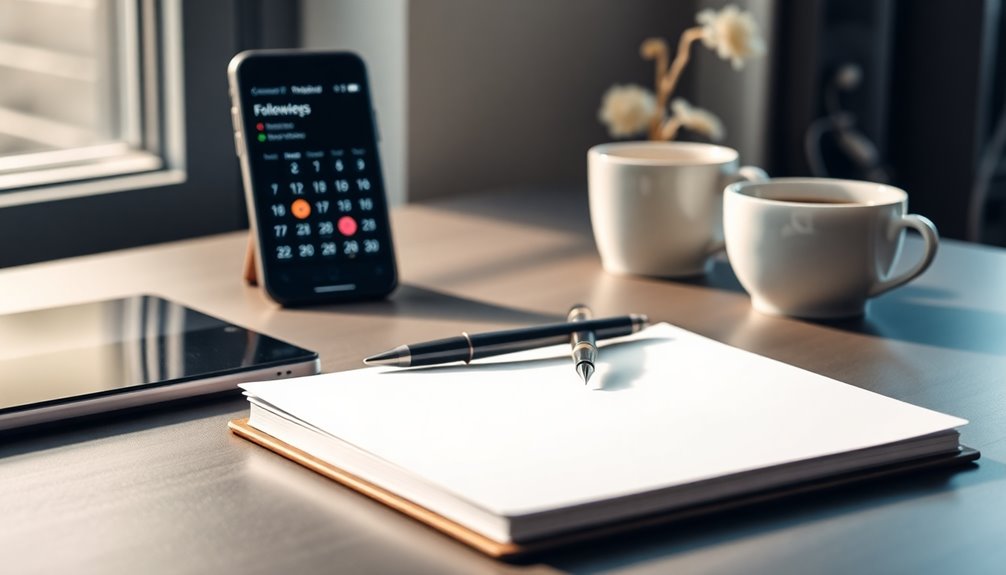To make employers keen to hire you, follow up within 24-48 hours after your interview. Use email for a thoughtful response, and always start with a thank-you note. Recap your strengths and express your enthusiasm for the role. Make sure your subject line clearly states the position you applied for. Don't hesitate to connect on LinkedIn or follow up with a phone call if needed, but keep it professional. Maintain a polite tone and limit your follow-ups to two. By mastering this approach, you'll stand out and catch their attention like never before. Keep exploring this technique to reveal even more success!
Key Takeaways
- Follow up within 24-48 hours post-interview to express gratitude and reinforce your enthusiasm for the role.
- Use a professional email format, including the job title and application date to keep your message clear and relevant.
- Highlight your key skills and qualifications that align with the job to remind employers of your unique fit for the position.
- Limit your follow-ups to a maximum of two, maintaining professionalism and politeness in all communications.
- Utilize multiple methods, such as LinkedIn connections or phone calls, to demonstrate your commitment and eagerness for the opportunity.
Importance of Timing

Understanding the importance of timing in follow-ups can greatly influence your job application success. You want to aim for that sweet spot of 24-48 hours after your interview to send your follow-up message. This timeframe allows you to reflect on the conversation and craft a thoughtful response that shows your eagerness while respecting the interviewer's time. Following up on the same day can come off as overly keen, so it's better to wait until later in the day if you choose this route. If the interviewer mentioned a specific timeline for their decision-making, respect that. Waiting about a week after submitting your application or having an initial interview gives the hiring team adequate time to review all candidates. Additionally, this period allows you to demonstrate genuine interest in the role, which can set you apart from other candidates.
Choosing the Right Method

When it comes to following up on your job application, selecting the right method can make all the difference in how your message is received.
Email is a professional choice, allowing you to craft your message carefully without pressure. Be sure to include the job title, application date, and express your continued interest. Personalizing the email with specific details about the position or company enhances its impact. Additionally, clear communication is vital to ensure your enthusiasm and intent are effectively conveyed.
A phone call can also be effective. It requires a concise statement of purpose, where you state the job title and express enthusiasm. Make sure to leave room for the hiring manager to respond, and if you leave a voicemail, include a clear call to action.
If the company has a strong LinkedIn presence, consider connecting with the hiring manager there. Sending a personalized connection request can demonstrate your interest effectively.
You might even use multiple methods strategically, but avoid coming off as desperate. Each follow-up should add value, like new skills or certifications, as it shows your commitment and eagerness to join the team.
Keep track of your methods and timing to maintain professionalism and tailor your approach to the company culture. Choosing the right method can greatly enhance your chances of making a positive impression.
Crafting Your Message

Crafting a compelling follow-up message is essential for making a lasting impression after your job application. Start with a clear subject line that includes the position you applied for. Keep it short, relevant, and engaging. Open your message with a thank-you note, addressing the hiring manager by name if you can. Be concise and to the point in your opening paragraph.
Next, briefly recap your interview or application, reiterating your enthusiasm for the position and the company. Mention specific aspects that excite you and explain how your interests align with the company's goals. This shows you're genuinely invested.
Then, highlight your key skills and qualifications. Remind the hiring manager how your experiences relate to the job requirements, providing examples of how you can benefit the company. Instead of merely repeating your resume, interpret your background from the employer's perspective, emphasizing what sets you apart. Follow-up emails can serve as a reminder to recruiters about your fit for the role and can enhance your visibility among other applicants.
Finally, end with a polite closing, thanking the hiring manager for their time. Include your contact information for easy follow-up, and suggest the next steps, such as a follow-up interview or offering additional information. This proactive approach keeps the conversation going.
Identifying the Right Contact

Finding the right contact can make all the difference in your job application process. Start by utilizing your network. Connect with alumni on LinkedIn, join industry-specific groups, and engage in discussions.
Don't overlook professional groups or even local community connections—your neighbors, charity contacts, or church members might've valuable leads.
Next, research company contacts thoroughly. Visit the careers page of the employer's website to find job listings and HR contacts. Check press releases for hiring updates and look up industry publications for job opportunities.
If you need to, verify contact information through the company's switchboard. Aim for accuracy in contact details as 25% of executives change positions yearly.
Expand your contact list by attending social and community events. Organize gatherings like cookouts or attend weddings to build relationships in a relaxed atmosphere.
Leverage your spouse's professional network and join local chambers of commerce for more connections.
Lastly, confirm that the contacts you gather are up-to-date. Verify emails using tools like Voila Norbert or NeverBounce, and regularly refresh your list as corporate executives often change positions.
Managing Follow-Up Frequency

Managing follow-up frequency effectively can considerably impact your job application success. Start by waiting 48 to 72 hours after submitting your application through an online portal before your first follow-up. If you applied via a known contact, reach out within a week.
Avoid rushing to follow up unless you need to confirm receipt of your application, in which case a call within 24 hours is best.
After an interview, send a thank-you email on the same day, followed by a follow-up email a week later. If you haven't heard back after that, send one more follow-up a week later, but remember, two follow-ups is the maximum. Reference key points from your interview to remind them of your conversation.
Don't follow up too frequently. Space your follow-ups to give the hiring process time to unfold. Monitor the company's hiring timeline and adjust your follow-up frequency based on their typical response times. Demonstrating genuine interest in the role can further enhance your chances of standing out.
Always keep your messages professional and polite, as this maintains your reputation and keeps you in good standing with potential employers.
Frequently Asked Questions
What Should I Do if I Don't Hear Back After My Follow-Up?
If you don't hear back after your follow-up, wait another week or two before reaching out again.
Keep your message brief and reiterate your interest in the position. Thank them for their time and express your enthusiasm to contribute.
If they still don't respond, it's best to move on and continue applying elsewhere.
Can I Follow up More Than Twice Without Seeming Pushy?
Picture yourself as a detective, piecing together clues for your next career move. Yes, you can follow up more than twice, but tread lightly.
After two attempts without a response, it's best to pause and reassess. Keep your messages concise and add new insights each time, so the hiring manager sees your continued interest without feeling overwhelmed.
How Do I Find the Hiring Manager's Email Address?
To find the hiring manager's email address, start by checking the job posting and the company's website for contact details.
Use Google to search their name alongside the company, refining your results with operators.
LinkedIn's a great resource too—search for their profile and see if they list any contact information.
If you're still stuck, consider calling the company directly or using email finder services to get the info you need.
Is It Okay to Follow up on Weekends or Holidays?
Did you know that 70% of hiring managers check emails less on weekends?
It's best to avoid following up during weekends or holidays. Your message might get buried in a pile of emails, delaying your response.
Instead, opt for Tuesday through Thursday, when hiring managers are more likely to be active and focused.
This approach shows you respect their time and increases the chances of a prompt reply to your follow-up.
What if I've Changed My Mind About the Position?
If you've changed your mind about the position, it's essential to act quickly.
First, make sure you're certain about your decision. Then, review the contract for any obligations.
Notify the employer as soon as possible and provide a brief, honest reason for your change of heart.
Remember, being transparent can help maintain a positive relationship, which may benefit you in the future.
Handle the situation professionally to protect your reputation.
Conclusion
So, if you want employers begging for your talent, just follow these steps like a pro. Timing’s essential, right? Choose your method wisely—maybe a singing telegram? Craft your message so well that Shakespeare would be jealous. Just don’t forget to identify the right contact; no one wants an awkward email to the janitor. And remember, follow up just enough to seem enthusiastic, but not so much that they think you’re stalking them. Happy job hunting! And once you’ve made contact, be sure to ask the right questions. Show genuine interest in the company and the role, and ask thoughtful, engaging questions that demonstrate your preparedness and enthusiasm. This will leave a lasting impression and set you apart from other candidates. Good luck!









